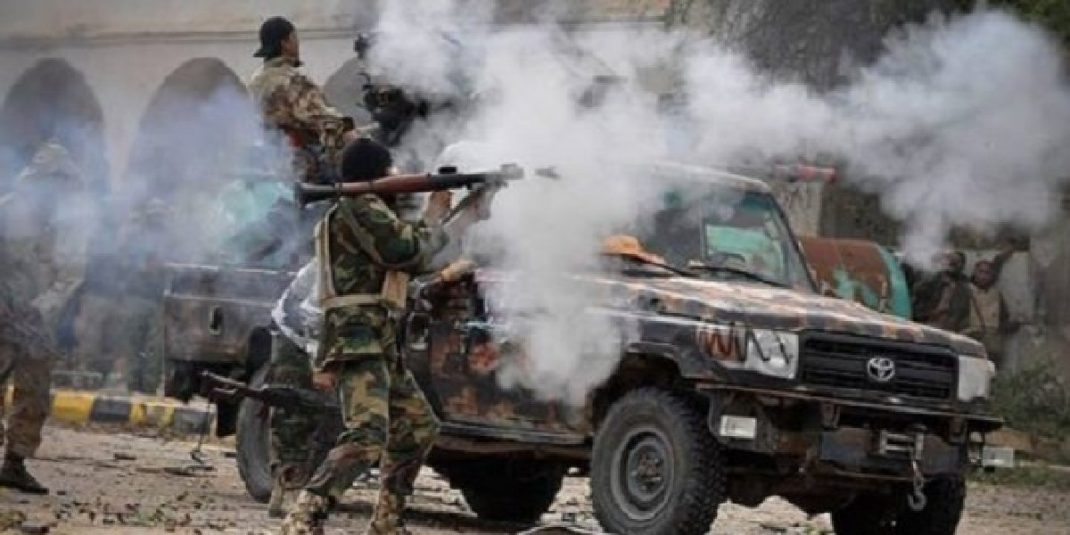Libya remains embroiled in political deadlock and civil war.
Amid foreign motivesand the struggle to achievethe necessary stability in the region,the situation is growing more complex,while the external forces at play viciously pursue their political goals beyond any measure of reaching a consensual resolution that may put an end to the current Libyan crisis.
Presently there are two major dominant powers in Libya. First is the United Nations-led initiative represented bythe internationally recognized Government of National Accord whose Prime Minister is Fayez al-Sarraj. The second is Operation Dignity led by Field Marshal Khalifa Belqasim Haftar which has earned unconditional support from Egypt and the UAE, and less from France whose objectives are to guarantee its interests in the south after the settlement of the government.
France sees in Haftar the man who can ensure its privileges inLibya, which if he manages to come to power, will have political and economic payoffs. Economically, Haftar is a means for France to guarantee its entitlements south of the fertile and wealthy land and to facilitate connections with its antecedent colonies such as Chad, Niger, and Mali.Politically, the man is France’s war machine on political Islam.
France claims to back the National Project in Libya by supporting the Government of National Accord, but it is in fact working strongly against any active presence that bearsan Islamic orientation. It is nevertheless working to guarantee its interests with the next stable government in Libya. Accordingly, its relationship with Haftar is temporarily based on realizing its objectives.
For France Haftaris a general struggling to establish an already refutable dictatorship that bears a striking similarity with the Egyptian model. It also seems that France is aware ofhis unfeasible dominance of the country, considering the international outlook which condemns the marshal’sideologyand its supporters.
The aim of “OperationDignity” ismilitary dominance of Libya and the establishment of an authoritarian regime which resembles the Egyptian one. This plot is under full supervision by Egypt and the Emirates.Khalifa Haftar is the very picture ofGeneral Sisi, they share common goals and a mutual vision and they arein full agreement with the rulers of theEmirates who see the rise of the newly awakened political Islam and the Arab Spring as a threat to their interests and adanger to their existence.
These two countries recently urgedHaftarto do quick-moving operations in order to win the battles of Benghazi and Derna in the East, and to gain control over key areas of the south. ExpectingAl-Serraj to bringHaftarinto the Government of National Accord as his defense minister, but their endeavorsfailed remarkably. Operation Dignity is also allied with a regional mission led by certain Gulf countries and Egypt.
A recent development had drastic effects on Libya whenAbdullah al-Thinni, another ally of Operation Dignity announced a boycott against Qatar, following the lead of Egypt, theEmirates, Saudi Arabia, and Bahrain. The military Governor of the Eastern region also announced strict procedures against the followers of Al Jazeera channels. In addition, Khalifa Haftar put his forces under the authority of the United Arab Emirates in the ploy against Qatar, accusing it of being a supporter ofArab revolutions and democracy in the region and labeling it as a“source of terrorism.”
The UAE is not only supportive of OperationDignity’sProject, but also backs many politicians who are against Islamic tendencies and who oppose the revolutionary line in the East, West and South of Libya. The UAE has also been offeringhuge financial support to its loyal political and military entities. It seems thateven the United Nations mission could not resist temptations from the UAE, asthere have beenrumorsthat Bernardino Leon was receiving one thousand dollars a day from the UAE throughout the period of supervision in his UN mission to Libya.
The UAE intervention in Libya has beenextensive and complex.Thesheer volumeof the last annual report issued by the United Nations on Libya is enoughto realize thescale of this intervention. The United Nationsreport reveals the abundance of UAE funds, specifically the millions of dollars paid to Haftar and his sons, as well as other well-known agencies.The report also reveals thecopious amount of weapons shipped from the UAE to The Port of Tobruk, from military equipment to tanks and armor.
Never mindthe military bases hosting UAE planeswhich have been targeting the areas of Saabri and the Whale Market in support of Haftar’s ground forces against the Shura Council of Benghazi Revolutionaries. Besides, the report reveals several UAE-backed television channels that are working tirelesslyto influence public opinion against the “17 February”revolutionaries, hand in hand with Libyan media to incite sedition.
There is a big question mark over the stability of Haftar’s relationship with the terrorist organizationDaesh in Libya. It is impossible for the general to be able to deal with the extremist group without being under full supervision of the Egyptian-UAE’s operations room in the East of Libya. There are also accusations that the UAE is behind an attempt to re-implant the terrorist organization in the West of Libya after the violent blow Haftar received in Subrata. Noting that some recent Daesh activity has been detected in the south of Subrata.
Furthermore, the military junta of the city led by Colonel Tahir Al-Gharabliwho had great credit for the elimination of Daesh in Subrata,along with some politicians and a group of Libyan officers known for their loyalty to the rebellion, were labeled as terrorists in a list formulated by Operation Dignity’s Chamber in the East…The revolutionists blame Qatar and Turkey for only resorting to political support, whichis advantageous to the two countries who are looking for a peaceful political compromise in the disaster-stricken country.
Notwithstanding the huge difficulties,owing to the complexity of the scene andferocity of conflicting agendas, the National Project in Libya stillstands firm. The project presented by Al-Sarraj’s Government introduces a consensual proposition,but it excludes those who support terrorism or have been classified terroristic.That same condition is still hindering it ―2 years on― from reaching an agreementthat gathers all conflicting parties around a unified vision of a national rescue project.
_____________




